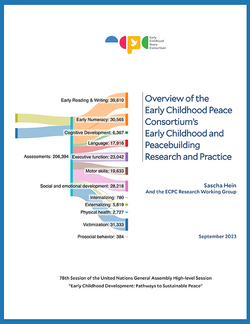| Title | Overview of the Early Childhood Peace Consortium’s Early Childhood and Peacebuilding Research and Practice |
| Publication Type | White paper |
| Authors | Hein, Sascha, and ECPC Research W. Group |
| Full Text |
Overview of the Early Childhood Peace Consortium’s Early Childhood and Peacebuilding Research and Practice
| Title | Overview of the Early Childhood Peace Consortium’s Early Childhood and Peacebuilding Research and Practice |
|---|---|
| Publication Type | White paper |
| Published Year | 2023 |
| Publisher | Early Childhood Peace Consortium |
| Authors | S. Hein; E.C.P.C.Research W. Group |
| Grant List | - |
JOIN THE CONVERSATION
For breaking news and to stay connected, follow us on social media. Sign up to get our E-News delivered straight to your inbox.


